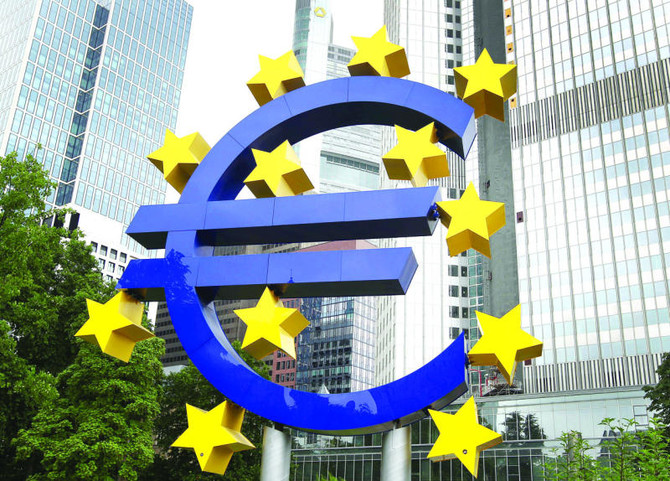LONDON: If there is a symbol of British ambivalence to Europe then it may be the euro itself.
The capital of euro trading prospers outside the euro zone, but London’s dominance of the $5.3 trillion-a-day foreign exchange market could wane if Britain left the European Union.
While British leaders have long resisted replacing pounds with euros, traders in the City of London financial center now buy and sell more than twice as many euros as the whole 19-member euro zone and more dollars than the United States.
For four decades, London has been the undisputed king of foreign exchange, but some investors fear that if British voters decide to leave the EU, the City would eventually lose its top position, especially in euro trading.
“If the UK left the European Union, London’s dominance of foreign exchange including euro trading would gradually decline and then end as the flows moved to Asia and other European capitals,” US investor Jim Rogers, who co-founded the Quantum Fund in 1973 with George Soros, said.
“London’s dominance of the foreign exchange market evolved historically but evolution will continue in other places if the UK leaves. It would be foolish to leave the EU, but politicians have done foolish things since the beginning of time.”
Twelve years after Rogers left Quantum in 1980, Soros used the fund to bet successfully that sterling was overvalued against the Deutsche Mark, culminating in Britain’s biggest financial humiliation since the sterling crisis of 1976.
On so called ‘Black Wednesday’, Sept. 16, 1992, Prime Minister John Major was forced to pull sterling out of the European Exchange Rate Mechanism (ERM), which had been intended to reduce exchange rate fluctuations ahead of monetary union.
Fast forward two decades: European efforts to forge an enduring monetary union are at the center of a debate within the London elite about post-imperial Britain’s place in Europe and whether it might not be worth striking out alone.
The shadow of the euro falls across Prime Minister David Cameron’s attempt to renegotiate Britain’s relationship with Europe, then hold a referendum on membership by the end of 2017.
‘KING OF FOREX’
Sold sedately for centuries at the Royal Exchange opposite the Bank of England, foreign exchange is now traded at high speed among mostly foreign banks such as Citi, Deutsche Bank, Barclays, JPMorgan and UBS.
London accounts for 41 percent of global foreign exchange turnover, more than double the nearest competitor, New York, according to the Bank for International Settlements. London’s closest European competitors are Switzerland and Paris, which each take about 3 percent of global foreign exchange turnover.
Yet London wasn’t always king of forex: The hegemony of the pound sterling in the British empire meant that before 1914, London played second fiddle in forex to Paris, Vienna, Berlin and New York. And London’s rise was partly due to good fortune.
As the center for global dollar trading, it benefited from the greenback’s rise. The growth of international banking during the 1950s and 1960s put it in pole position to benefit from the foreign exchange trading boom when floating exchange rates were adopted in the early 1970s.
Since UK exchange controls were scrapped in 1979, London has thrived as a center for everything from foreign exchange and bonds to derivatives and fund management, making it the largest net exporter of financial services in the world.
By the end of that decade Britain was top, and its dominance has strengthened ever since. Though the euro’s introduction reduced the number of currencies traded, London emerged as the global center for the most traded currency pair, EUR/USD.
“If Britain left the EU, that trade is gone,” said one senior European diplomat, waving his hand. “The first thing Berlin and Paris would do is to sit down and say: ‘How do we bring that business back?’“
‘TREASURE ISLAND’
London offers by far the deepest pool of capital in the time zone between Asia and the United States, but also a feast for the global merchant: property rights, a small army of lawyers and accountants, luxury property and shopping, quality private education and a wider cultural renaissance unmatched in Europe.
To be sure, London’s trading cables and wider pull, combined with institutional inertia, mean that any shift to the continent after a so-called “Brexit” would be gradual.
“The wires that make the trading of FX electronic are all in London and so a quick move from the UK to Europe would require infrastructure spending,” said Robert Savage, the CEO of CC Track Solutions, a New York-based hedge fund with $100 million under management. But over the longer term, he sees foreign exchange trading moving away from London and Europe if Britain leaves the EU.
“The volume of business in FX is likely to shift from the EU and UK to the US and Asia,” Savage said. “Big picture, the flow of capital is the driver of FX markets and the Asian centers are on the rise.”
Britain’s allies say leaving the world’s biggest trading bloc would be foolhardy, leaving London’s financial powerhouse subject to rules it would no longer influence and turning it into an insignificant offshore ‘Treasure Island’.
Opponents of the EU say London would thrive outside. They note that doomsters cried wolf in the 1990s, warning that London would wither as a financial center if Britain didn’t dump sterling and join the euro. That did not come to pass.
‘Brexit’ fears haunt London’s roaring trade in euros
‘Brexit’ fears haunt London’s roaring trade in euros










